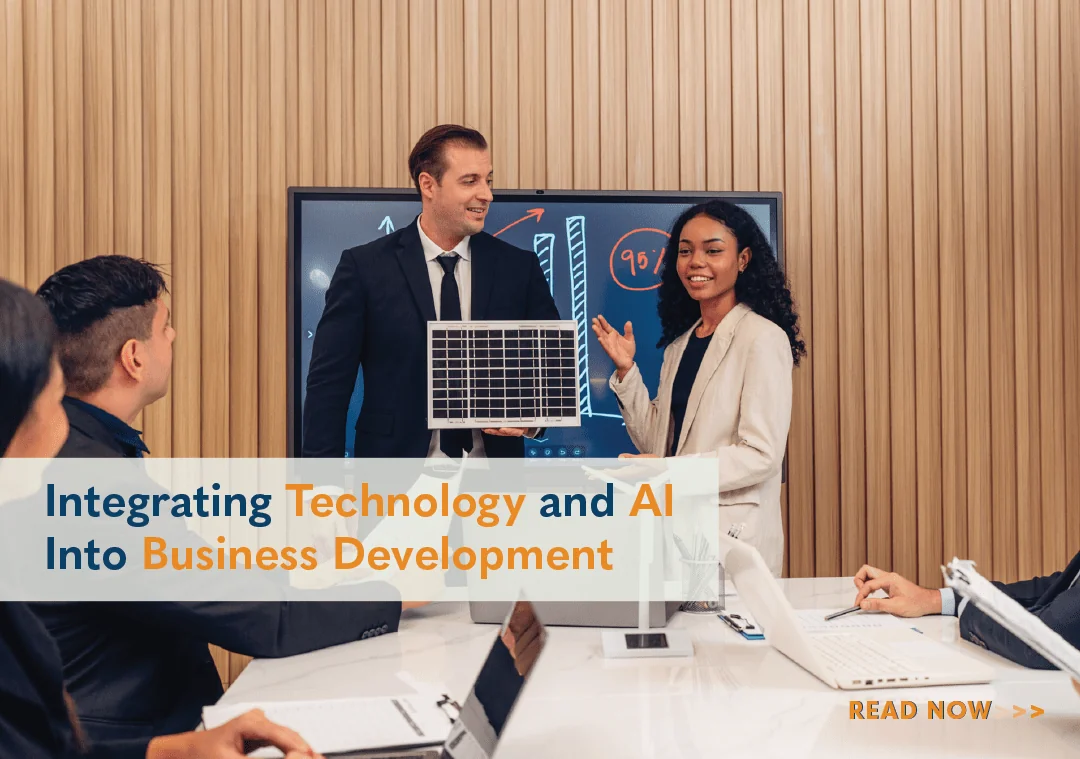Integrating Technology and AI Into Business Development

To stay competitive in today’s fast-paced digital landscape, sales organizations must continually adapt and evolve. One essential area is business development. This is the process of establishing new markets, building relationships, and expanding your customer base. In this, it is central to an organization’s growth and success. Currently, with technology and the rise of Artificial Intelligence (AI), companies have unprecedented opportunities.
The Sales Mastery Scorecard shows the emerging prevalence of AI. They note 75% of B2B sales professionals plan to evaluate, are evaluating, or are currently implementing AI solutions. However, they also note 29% don’t think it’s a big deal. And another 21% have no opinion. This could prove costly.
Our recent webinar Turbocharging Business Development Strategies introduced the role of technology and AI. There, we presented how AI is already proving beneficial. Here, we’ll explore its potential as a sales team’s partner to streamline and optimize business development.
Traditional Business Development Limitations
Business development strategies are often limited by traditional and outdated activities, processes, and methods. As such, sales leaders can be slow to adapt and miss opportunities. This enables better-positioned competitors to snatch up new business. Also, like a Trojan horse, they may gain an entry into tried-and-once-true clients. Some limitations include:
- Limited reach
- Information overload
- Inefficient lead qualification
- Lack of personalization
- Slow adaptation
Relying solely on traditional methods, like cold calling and networking, can limit connecting with potential clients.
Managing vast amounts of data related to leads, prospects, and market trends can be overwhelming and inefficient.
Manual lead qualification processes can be time-consuming and error prone. This often leads to wasted resources and missed opportunities.
Generic marketing and sales approaches often fail to address the specific needs and pain points of individual clients. This can result in lower conversion rates.
Businesses that fail to embrace technological advancements risk falling behind. As we saw in the Sales Mastery data above, many sales organizations already leverage these tools. These teams gain a competitive edge over laggards.
Technology and AI Today
Technology, including AI and machine learning, offers innovative solutions to overcome traditional business development challenges. Here’s how:
- Data-driven insights
- Automation
- Personalization at scale
- Enhanced customer experience
- Predictive lead scoring
Advanced analytics tools enable organizations to quickly analyze and leverage insights from vast amounts of data. Plus, predictive analytics can forecast market trends and identify potential leads. This enables sellers to prioritize prospects based on their likelihood to convert. Further, data-driven decision-making lets sales teams focus on high-value opportunities. Thus, they can optimize resource allocation and increase efficiency.
Gartner research shows the rise of AI’s data-driven insights. By 2026, 65% of B2B sales organizations will move from intuition-based to data-driven decision making.
Automation technologies streamline routine tasks, such as lead scoring, email outreach, and follow-ups. This ensures timely responses and consistent engagement through the sales funnel. Also, automation frees time and resources for more human activities, like creative and strategic thinking.
AI-powered personalization delivers tailored content, recommendations, and offers to individual prospects. Personalized communication fosters stronger connections. This enhances customer satisfaction and increases the potential for conversion. It also ensures marketing messages resonate with target audiences across various channels and touchpoints.
According to McKinsey, end-to-end B2B personalization boosts revenue 5-10%. It also results in 20-25% higher sales productivity.
Chatbots and virtual assistants provide 24/7 real-time support. Leveraging natural language processing (NLP), they increasingly understand and respond like humans. Plus, self-service portals let clients find answers on their own. This reduces the number of support agents needed.
Also according to Statista, 26% of B2B marketers using chatbots gained 10-20% more lead volume. An additional 25% gained between 5-10%. Plus, 15% said chatbots increased lead gen more than 30%.
AI algorithms analyze data history and customer behavior to predict the likelihood of lead conversion. Further, predictive lead scoring helps sales teams prioritize leads based on their ability to buy. This lets sellers focus on prospects with the highest ROI. By accurately identifying qualified leads faster, sales organizations can achieve higher conversion rates.
Implementing Technology and AI Into Business Development
Successfully incorporating technology and AI into business development requires a strategic approach. Here are some keys:
- Define clear objectives
- Invest in the right tools
- Emphasize training and upskilling
- Monitor and update
Start by defining specific goals and outcomes. These include increasing lead generation, improving conversion rates, or enhancing customer satisfaction. Next, your technology must align with your aims, needs, and budget.
Research vendors with proven records developing AI-powered tools tailored to your industry and market. Consider scalability, ease of integration, and ongoing support.
Train sales teams to leverage technology and AI. Ongoing sales training and coaching can help integrate tech and AI into reps’ activities and processes.
Define the necessary KPIs to measure, monitor, and analyze the impact of technology and AI. Use feedback, data insights, and market trends to identify weaknesses and update your strategies.
Benefits of Technology and AI in Business Development
Integrating technology and AI into your business development strategy offers a wide range of benefits. These include:
- Improved efficiency
- Enhanced lead generation and qualification
- Greater customer engagement
- Increased revenue and ROI
Automation speeds processes, reduces workload, and minimizes the risk of errors. Plus, AI-driven analytics provide real-time insights. This enables sales teams to make more informed decisions faster.
Predictive analytics and lead scoring algorithms are game changers. These quickly identify high-quality leads, enabling sales teams to prioritize prospects with the greatest likelihood of conversion.
In addition, AI can deliver personalized content tailored to a specific prospect’s preferences and needs. This drives engagement and increases conversion rates. Today, Gartner notes 52% of B2B marketing pros utilize predictive personalization. Also, 36% use predictive analysis for campaigns.
Chatbots and virtual assistants can provide round-the-clock support. This drives satisfaction and enhances the customer experience, increasing engagement and promoting brand loyalty.
By optimizing lead generation, qualification, and conversion, AI can boost revenue and ROI. Simply put, more efficient and effective business development means more business.
Challenges and Considerations
While technology and AI are essential for today’s business development, they do present challenges. These include:
- Data privacy and security
- Complex integration
- Talent acquisition and training
- Bias and ethical concerns
Proactive management of sensitive data is a must. This includes complying with privacy regulations, such as GDPR and CCPA. It also requires guarding against data breaches. Today, this is a key component of trust. A 2023 survey by MarketingCharts shows 79% of customers list data protection as their top trust builder.
Integrating disparate systems and data sources can get complicated. And this requires departmental coordination and collaboration. However, tech solutions must integrate with existing infrastructure and be scalable to meet changing needs.
Recruiting and retaining skilled professionals is always a challenge. But it can be especially difficult for specialized expertise, such as AI and data analytics. Hiring practices must be updated to attract top talent. In addition, ongoing training must upskill existing teams to keep pace. According to McKinsey, 80% of sales leaders rank analytic and quantitative skills as top capabilities.
AI algorithms can be prone to bias and discrimination. This can present ethical concerns. Today, AI use requires human intelligence and oversight to ensure fairness and transparency.
Trends and Opportunities
Several trends are poised to shape the future of technology and AI in business development. These include:
- Hyper-personalization
- Augmented intelligence
- Predictive relationship management
- AI-powered innovation
AI and machine learning enable hyper-personalized marketing and sales strategies. These are tailored to individual preferences, behaviors, and situations.
Combined, human expertise and AI-driven insights provide superior intelligence. This enables sales and marketing teams to work smarter and make better decisions.
From lead scoring to forecasting, predictive analytics can anticipate customer lifetime value and churn. This allows prioritizing and strategizing relationship building.
By improving and accelerating product development, AI brings better products to market faster.
Conclusion
Technology and AI are revolutionizing how sales organizations attract, engage, and retain clients. And these key components of business development deliver superior customer experiences and drive revenue. This is not a fad. Therefore, it’s no longer a question whether sales organizations implement AI. Rather, it’s how soon can you get up to speed?
However, as success requires planning, tools, and talent, it also demands security, ethics, and responsibility. There are real challenges and concerns we must address. But, by embracing technology and AI, organizations are better prepared to capitalize on emerging opportunities. We hope this helps you integrate technology and AI into business development.

- Account Planning (11)
- Awards (49)
- Client Testimonial (37)
- Personal Branding (19)
- Podcast (11)
- Research (70)
- Sales Career Development (87)
- Sales Coaching (156)
- Sales Consulting (137)
- Sales Culture (170)
- Sales Enablement (354)
- Sales Leadership (109)
- Sales Management (248)
- Sales Negotiation (16)
- Sales Prospecting (125)
- Sales Role-Playing (18)
- Sales Training (235)
- Selling Strategies (263)
- Soft Skills (70)
- Talent Management (94)
- Trusted Advisor (27)
- Virtual Selling (49)
- Webinar (9)


























